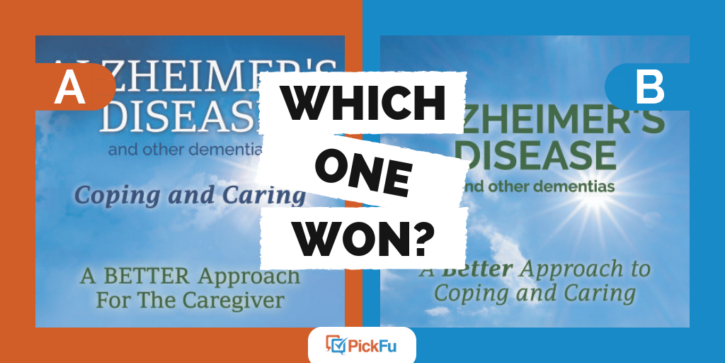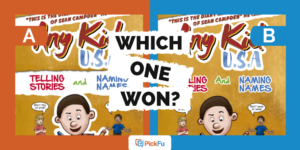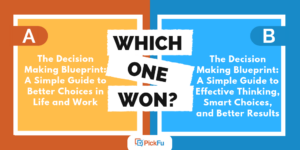It’s important to know how to write a medical book title that calls attention to itself. Titles are the first thing potential readers notice when they browse books. With nonfiction books especially, titles play a crucial role in marketing: unlike with fictional novels, readers want to know exactly what they’re getting.
One medical author created a PickFu poll to test potential titles for a nonfiction book about handling Alzheimer’s. The book aims to appeal to caregivers.
Option A is Alzheimer’s Disease and other dementias: Coping and Caring. A BETTER Approach For The Caregiver. Option B is Alzheimer’s Disease and other dementias. A Better Approach to Coping and Caring.
Can you guess which one won?
And the winner is…Option A! Option A won with a score of 56 to Option B’s 44.
So what is it about Option A’s title that makes it the best choice?
It’s clearly for caregivers
Right there in the title, Option A makes clear who its intended audience is: caregivers. Option B is fuzzier on who’s supposed to read the book.
While someone with Alzheimer’s or dementia might be able to read the book themselves, they would probably benefit the most from having their caregiver(s) read and apply the knowledge.
One tester said she liked that Option A’s title is clear about how “the book is for the caregiver and realizes that they too are affected by the disease.”
“Coping and caring” is better as a standalone subtitle
While the phrase coping and caring appears in both titles, testers felt that it worked better as a standalone subtitle.
Said one respondent, “I like that caring and coping is in the middle by itself, making it more prominent. It helps you to know just by a glance what to expect from the book and how a caregiver can help.”
Another respondent, an Alzheimer’s caregiver herself, agreed. She felt that Option B’s “a better approach to coping and caring” sounded off-putting to a caregiver. “I actually felt kind of judged by the title in B like I’m not caring enough. It may not make sense but that was my honest gut reaction.”
You definitely don’t want your potential reader to feel judged by your book title!
A different respondent who also has experience in Alzheimer’s and dementia care added that coping and caring are essential to dealing with the challenging behaviors and needs that come with Alzheimer’s and dementia.
Having an important and loaded phrase like this stand alone makes it pop out immediately to the reader.
How to write a medical book title: key takeaways
In a nonfiction medical book that appeals to caregivers — and in many types of self-help and nonfiction books — you want the target audience to know the book is for them. Option A’s “a better approach for the caregiver” tells you right away who the book is for.
You don’t want potential readers to feel judged. By saying “a better approach to coping and caring,” respondents felt that the title suggested they weren’t coping or caring well enough.
However, respondents liked seeing “coping and caring” on its own, because it made their eyes gravitate toward two important things caregivers must do every minute of every day.
Have you written a nonfiction medical or self-help book with a target audience in mind? Are you stuck on which titles to keep? Use split-testing in a PickFu poll to find out which title appeals most to potential readers.





